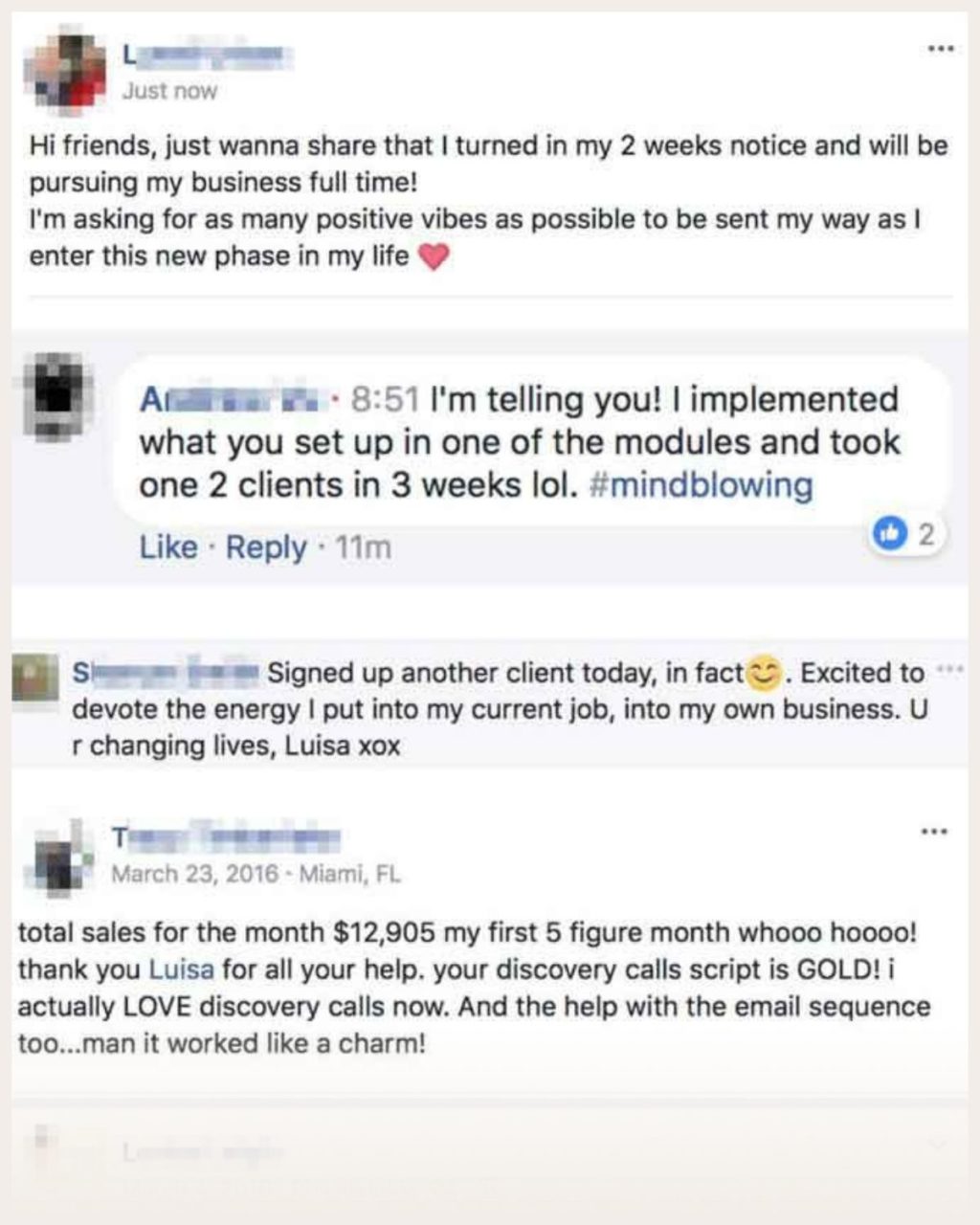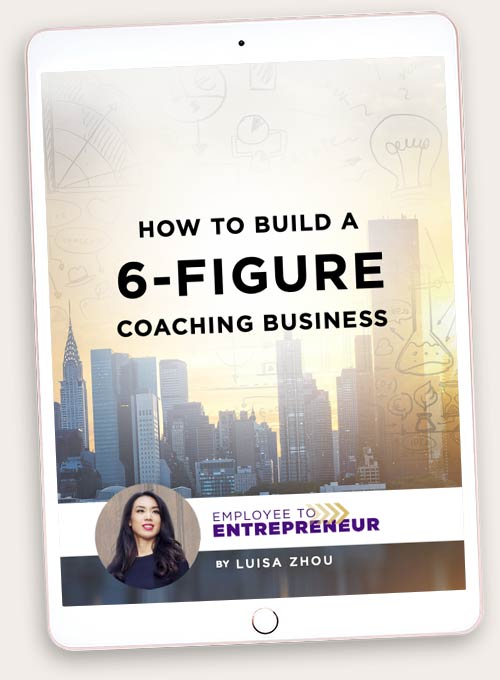Life coaching, done right, can be one of the most rewarding and fulfilling businesses to start.
Today, you’ll learn how to build a successful life coaching business. One that lets you…
- Wake up excited every morning
- Have the freedom to live life on your terms, and
- Change lives
The good news: The steps themselves are simple. But it’s how you implement those steps that makes all the difference.
So, how can YOU build a successful life coaching business?
Read on!
The steps to starting a life coaching business
3. Decide on a life coaching business name
4. Get the right coaching credentials
5. Set up your business legally
6. Create a life coaching package
7 Get your first life coaching clients
8. Market your coaching business
What is a life coaching business?
As a life coach, you help people achieve life goals – from finding love to getting promoted or dropping a dress size.
The most effective life coaches focus on a specific niche (such as health or career coaching).
Now, as you can imagine, a life coach is not the same thing as a therapist.
Get the Ultimate Guide
for building a
6-Figure Coaching Business so you can achieve more freedom!
Therapists help their clients cope with past trauma and life events.
They can diagnose patients and prescribe medication.
And they’re required to pass certain educational requirements.
Your life coaching business is focused on results – you people take certain steps to achieve a goal.
That’s why becoming a life coach can be highly fulfilling. You get to work with people on solving some of the biggest challenges they face in their lives.

But how do you start your business?
These 8 steps are THE foundation for your business.
Starting a life coaching business checklist
Read to take the next step? Here’s how to start a life coaching business online.
1. Choose your life coaching niche
As a life coach, you need to position your business in the right way.
“Life coaching” is broad and doesn’t offer a specific solution.
That’s why you won’t stand out if you call yourself a life coach.
Instead, you need to niche down to attract more clients.
A “mindset coach” or “health coach” helps people with specific problems, so someone looking for those types of coaches will pick them over a life coach.
Niching down has helped many of my own students make multiple six-figures a year while enjoying their lives to the fullest.
For instance, Spencer, who is a mindset coach, makes three times as much as she did in her day job and works less:
But how do you find a niche that’s profitable and matches your skills and interests?
First, write down a list of your skills.
Maybe you’ve learned them as part of your day job or on the side.
Example #1:
Knowing how to manage people – A skill you’ve learned in your day job.
Example #2:
Eliminating sugar from your diet – A skill you’ve learned on your own.
These skills could translate into career or health coaching.
Second, write a list of your achievements.
What results have you achieved? For example, maybe you have:
- Gotten promotions
- Negotiated a higher salary
- Lost weight
- Gone from feeling constantly stressed and unfocused to being calm and focused
Those are all results you could use as your coaching niche.
And if you want more on finding your niche, take a look at this quick video where I share more steps:
Life coaching niche examples
But how do you know what niches are actually profitable?
Here’s a list of profitable life coaching niches (and if you need more, you get 100+ niche ideas in this post):
- Health coaching
- Relationship coaching
- Mindset coaching
- Financial coaching
- Performance coaching
- Parenting coaching
- Stress coaching
- Happiness coaching
- Career coaching
- Spiritual coaching
- Public speaking coaching
- Confidence coaching
For example, my student Briana built a multiple 6-figure business helping people understand their attachment styles for better relationships…
And my student Adunola helps millennials build their dream careers…
While Estelle is an energy healer.
What if you’re multi-passionate?
But…do you have to “get stuck” in one niche? What if you’re multi-passionate and don’t want to focus on just one thing?
Don’t worry. Getting started in one niche is just that…a start.
After you master one niche, it’s natural to expand into other niches so that you can reach even more people.
But you need to start somewhere. And that’s why finding your first niche is so important.
Finding your niche is just step one, though.
To build a truly successful coaching business, you have to understand why people want to work with you. (The biggest mistake you can make is to assume things about your clients.)
So go on to step 2 to learn how to find the right people for your coaching business.
2. Research your market
Now it’s time to research your audience.
You see, your business will only work if you understand who they are.
If you don’t, you won’t speak their language.
And you won’t be able to explain the benefits of your services in a way that makes them go, “I need THIS.”
For instance, if you talk about “stress coaching” without really explaining the benefits, few people will pay attention.
But if you use the same words your clients use to describe their challenges and dreams, you’ll attract far more clients.
They might say things like “I’m overwhelmed and I never get to spend time with my kids or have time for myself.”
And that might resonate more with them than talking about “stress.”
Go to where they are hanging out online, whether that’s on Reddit, Instagram, or LinkedIn.
Take a look at the discussions.
What are their challenges and goals?
Or maybe you already have potential coaching clients in your existing network.
Post an update on a social media platform to ask people to do short interviews with you so that you can learn more about them.
To incentivize them, offer short, free coaching calls. (This is a great way to practice your coaching skills, too.)
Now you know who your audience is.
But how do you brand your coaching business and pick a name that people will remember?
That’s what we’ll look at next.
3. Pick a life coaching business name
People say you need to come up with a clever name for your business.
I don’t agree.
The most important thing you should be focusing on is getting clients.
And there’s an incredibly simple solution to naming your coaching business.
The thing is…
You can name your business after yourself.
After all, your business is your personal brand. So, just like I use my name (Luisa Zhou) as my business name (LuisaZhou.com), you, too, can use your name as your coaching business name.
Then, use that domain, such as www.YourName.com. (I use www.LuisaZhou.com.)
However, if you have a fairly common name, and your domain is already taken, add on “coaching” or “consulting” to your name.
Get the Ultimate Guide
for building a
6-Figure Coaching Business so you can achieve more freedom!
For example:
www.JaneSmithCoaching.com
You can always change your business name down the line.
However, if you want to go for a name that’s not your name, you’ll need to do some more brainstorming.
I have an entire guide on this so check it out to learn how to choose your coaching business name.
Next, we’ll look at what qualifications you need as a life coach.
(Note: Lots of people get this wrong.)
4. Get the right coaching credentials
People usually argue that certifications help lend credibility to coaching as it is an unregulated market.
But there’s one problem…certifications are also an unregulated market.
The only real way to develop your coaching skills is to work with clients.
And to make it a win-win, you can offer relatively low rates to your first few clients.
You can then raise them when you have proof that your coaching works (AKA client testimonials).
So no, you don’t need a certification to get started. If you have one, great, but it’s not a requirement.
However, I want to note here that there are niches where you DO need a certification so make sure that you’re aware of what applies to your niche. Typically, those are niches in the health and mental health spaces.
And if you decide to get a certification, make sure you buy it from a credible life coach institution such as the International Coach Federation.
Here’s my guide on the best life coaching certifications.
But if you don’t get a certification, how do you make sure you’re a good coach who can actually deliver on results?
Honestly, this was my biggest fear as a new coach.
Now, the traditional coaching model is “Socratic questioning” or helping your coaching client to find the answer themselves.
While this model is still useful, coaching can be combined with an approach that includes consulting to help your clients get faster results.
I call this approach “coach-sulting” and it’s all about helping your clients find out what they really want, while you lend your expertise to show them what steps they need to take to get there.
For instance, if you help someone find their dream job, you’d use a more traditional coaching approach to get them to understand what they want.
And then a more consulting focused approach to helping them land that job.
That’s how you become a great life coach! Let’s move on to the legal requirements of a life coaching practice.
5. Set up your coaching business legally
What business structure should you choose?
Two popular options are:
- Limited Liability Company (LLC): An LLC is a legal entity that is separate from its owners. You aren’t legally liable for your business.
- Sole proprietorship: A sole proprietorship is owned by one person and that person is liable for this type of business. This type of business comes with more risk.
You typically don’t need a license to operate as a life coach.
You also need to consider your taxes.
In short, you should get a tax identification number and understand your local tax regulations. But as taxes are a topic in itself, I recommend that you read more on the IRS website.
Another great resource is my friend Lisa Fraley’s Sole Proprietor Biz Registration and Taxes package, which helps you register as a sole proprietor, pay taxes, and understand what your legal obligations are as a business owner.
And if you want more protection for your business, consider getting life coaching insurance.
Finally, you need a coaching contract.
A contract is a way to set your boundaries in the coach-client relationship. You’ll avoid misunderstandings and conflicts (even if those are pretty rare).
The easiest (and safest) way is to buy a done-for-you, paid-for template instead of searching for free templates.
I recommend legal coach Lisa Fraley’s legal document package, “Legal Starter Kit for 1-on-1 Clients”, which includes a client agreement and all the legal documents you need for your website. (Including a disclaimer, terms and conditions, privacy policy, and a mini disclaimer for your social media and PDFs.)
When you have a contract in place and your first client, use HelloSign, an online contract management tool, to manage your contracts.
Next, let’s figure out what a high-ticket life coaching package looks like.
6. Create a life coaching package
What makes your life coaching package stand out?
Consider these three things…
Choose a price
First, choose the right price – not too high and not too low.
What’s the sweet spot?
A reasonable coaching price for new coaches is $1,500 for a three-month package.
You can then raise your rates when you have a bit of experience.
Here’s more on how to charge your worth as a new coach:
Create an irresistible offer
When you create a coaching package, you need to position it in the right way.
It’s not enough to say, “you get this and that many coaching calls and these pdf’s.”
Instead, talk about the transformation you offer.
Lead with the results and then share the features.
A three-month coaching package typically includes one or two monthly calls, as well as support in between (email, Voxer, WhatsApp, or Google Docs).
Structure your package
Your package needs a structure so your client has a plan mapped out for how they’ll reach their goal.
A career coaching package might look something like this:
Month 1 – Establish what type of job they want
This month, your coaching client does different types of exercises to understand what their dream job really is.
Month 2 – Apply to companies
In month 2, you help them apply, network, and get their name out there to help them get closer to their goal, finding a dream job.
Month 3 – Interviewing
In month 3, you help them nail their interviews so that they get accepted by their dream employer.
See how this coaching program focuses on a very specific end goal? That’s what your package should do, too.
Sell your packages
The final piece of the puzzle is to understand why something sells.
You see, back when I was a new coach online, I quickly realized something:
The best clients don’t always go to the best coaches.
Nope, instead…
The best clients go to the best positioned coaches.
As in, the ones who are considered “leaders,” “in demand,” “at the top of their game.”
Who are not just doing good work, but getting recognized for it.
It’s the reason why I was able to go from being *just another* coach to selling out every coaching package, and doubling, then tripling, and then quadrupling my prices.
To this day, I’ve quickly sold out every large-scale coaching package I offer.
And aside from the two years where I decided not to do private coaching, my private coaching has been full without me even having to promote it.
This is what happens when you’re seen as The Coach to go to (or at least one of them).
So that clients stop “interviewing” you to be their coach, and instead they come to you ready to work with you, you’re talked about and considered as one of the top, go-to coaches in your industry, and you attract the highest-quality, most motivated clients, who are happy to pay you and ready to do the work.
Here, I talk more about standing out as a coach:
7. Get your first life coaching clients
When you have all the fundamentals in place (a niche, an offer, and you’ve set up your business), you’re ready to start looking for your first clients.
You could focus on…
- Tapping into your existing network
- Publishing guest posts on websites your potential clients frequently visit
- Build relationships online on social media
…And more. Get all the strategies here.
But while there are plenty of strategies, you should focus on one or two and do them well.
That’s enough to get your first few sales.
Decide on your strategy
A great way to decide what you should focus on is to write a half-page description of someone you would LOVE to work with (even if you’re afraid it’s too good to be true).
Do all your future sales and marketing activities with this person in mind.
So if the person you would love to work with is a high-level executive at a big company, you’ll focus on sharing your message on LinkedIn.
Ask yourself:
Where does MY ideal client hang out online?
Focus all your efforts on reaching them there.
That said, I have a specific marketing strategy you can use right away…
One client acquisition strategy you can use
What’s one of the easiest ways to get clients?
Get the Ultimate Guide
for building a
6-Figure Coaching Business so you can achieve more freedom!
Getting interviewed on podcasts.
Podcasts are one of the most effective strategies to get your first paying life coaching clients.
But why would anyone want to interview you as a new coach?
Podcasts hosts are constantly looking for new people to interview, and new and valuable information to share with their audience.
Information you can provide.
It doesn’t matter that you’re new in your business. You’re not new to whatever it is you’re doing in your business. You know what you’re talking about!
For instance, my student Ryan got on top podcasts in his industry (real estate investing) and consistently gets clients from them. And my student Kat signed on $5,000 clients using podcasts.
Find podcasts by searching for keywords such as:
“Podcast” + “keyword”
“Top podcasts (year)” + “keyword”
And reach out to podcast hosts with a pitch similar to this one:
“Hi NAME OF PODCASTER,
My name is (your name) and I am (include something relevant about yourself so the podcaster understands why YOU are the right person to feature on their show).
I’d love to set up an interview for (name of the podcast). Here are a few topics that I think your audience would love:
- Podcast topic suggestion 1
- Podcast topic suggestion 2
- Podcast topic suggestion 3
Let me know if these would be interesting to (name of the podcast) listeners?
Best,
YOUR NAME”
I talk more about getting dream clients here:
8. Market your life coaching business
In the beginning, your coaching marketing plan should be pretty simple.
You should double down on what you’re already doing to get your first few clients.
To hit 6-figures in an online coaching business is not complicated. (Note that that doesn’t mean it’s easy.)
You don’t need a big team or a big suite of products to cross 6- or multiple 6-figures when you’re selling coaching.
Which means you spend your time becoming a good coach, creating your coaching program (as you work with clients), developing your marketing and sales systems, and then living your life.
However, one strategy that will help you get more clients is…
Word of mouth marketing
Early on, you have to “hustle” to get those first paying clients.
The good news is that getting more clients becomes easier the more people you work with.
Once your clients get results, you can ask for testimonials.
70% of people say they trust recommendations from someone they don’t even know. Testimonials are a powerful way to boost your sales.
They will help you build credibility and make it more attractive for people to sign up for your services because there’s already proof that your coaching helps people get results.
And once the word starts to spread about your coaching, you’ll get referrals. In other words, people will start coming to you instead of you having to chase them.
Scalable coaching marketing strategies
Other life coaching marketing strategies are…
- Paid ads: Paid ads are a highly scalable strategy that means that you pay for ads on a platform like Facebook. However, to run ads successfully, you need to allocate time to constantly testing different ads (or have the budget to hire an ads manager).
- SEO: SEO, or search engine optimization, means that you get your website to rank for different keywords on Google. For example, when people search for “best health coaches,” they find your website. While this is a scalable and profitable strategy (and my favorite strategy to grow my business), it doesn’t work overnight. You need to invest a good amount before you see results – which is why this is a strategy you can use a bit later on in your business.
Frequently asked questions about starting a life coaching business
Is life coaching a profitable business?
Coaching is a highly profitable business model.
As a coach, you sell your expertise and personal time. If you help people transform their lives, that’s worth a lot to them.
However, remember to niche down! That’s how you position yourself as the right choice for the right clients.
Are life coaches in high demand?
Yes, life coaches are in demand:
- The coaching industry is a fast-growing $2.85 billion global industry
- 99% of clients are satisfied or very satisfied
- 96% would repeat the process
- 63% of consumers prefer to spend on experiences where they learn something new
Coaching is becoming increasingly popular as people look for more meaningful things to spend their money on. You help people transform their lives by improving their mindset, becoming healthier, or finding love, while you build a flexible Freedom Business.
Do you need a life coaching website?
Typically, people start building their businesses by creating a website. But early on, a website isn’t that useful, and your time is better spent on other things.
You see, your website isn’t why they want to work with you. YOU are the reason.
I created a website when I had made $20,000 in my business. Before then, I sent people to my LinkedIn page if they wanted to learn more about me.
You don’t need a website right now, either.
Get the Ultimate Guide
for building a
6-Figure Coaching Business so you can achieve more freedom!
If you do set one up, choose a simple theme and just a few pages. Then focus on getting your first clients.
Do you need a life coaching business plan?
A lot of “gurus” tell you to create a business plan. But you don’t really need one.
A business plan is a waste of time when you’re first starting to find clients. Your offer might easily change when you talk to more and more people and understand their needs.
Your time is much better spent getting your first paying clients.
That said, if you do choose to create a business plan, make it simple.
In this post, I show how to write a proven coaching business plan.
What’s next?
There you have it! Now you know how to start a life coaching business.
It takes work, but it’s doable. And so worth it.
What it comes down to is that you take consistent steps every day to get results, focus on the things that will help you get your first paying clients, and help your clients achieve real results.
That’s how you build an impactful and abundant business.
Because a life coaching business can help you create a life you love – full of freedom and flexibility to spend your time like you want to and work from anywhere.
But while building a business is simple, it’s not easy.
In fact, it took me years to figure it out on my own.
Today, I’ve helped over 3,000 people start their own online business.
And they’ve all used a proven system that helps you attract paid clients and leave your 9-5 as fast as possible.
What is it?
Get my free, ultimate guide to learn more.

Want to Build a 6-Figure Coaching Business So You Can Achieve More Freedom?
Get Instant Access To My FREE Ultimate Guide Below!
When you sign up, you’ll also receive regular updates on building a successful online business.
Learn more:
How Much Do Life Coaches Make? (Life Coach Salary Guide)
The Top Life Coaching Services









One Response
Hi,
I am nervous about getting the first clients. Do you have suggestions besides doing the Podcast? Thank you